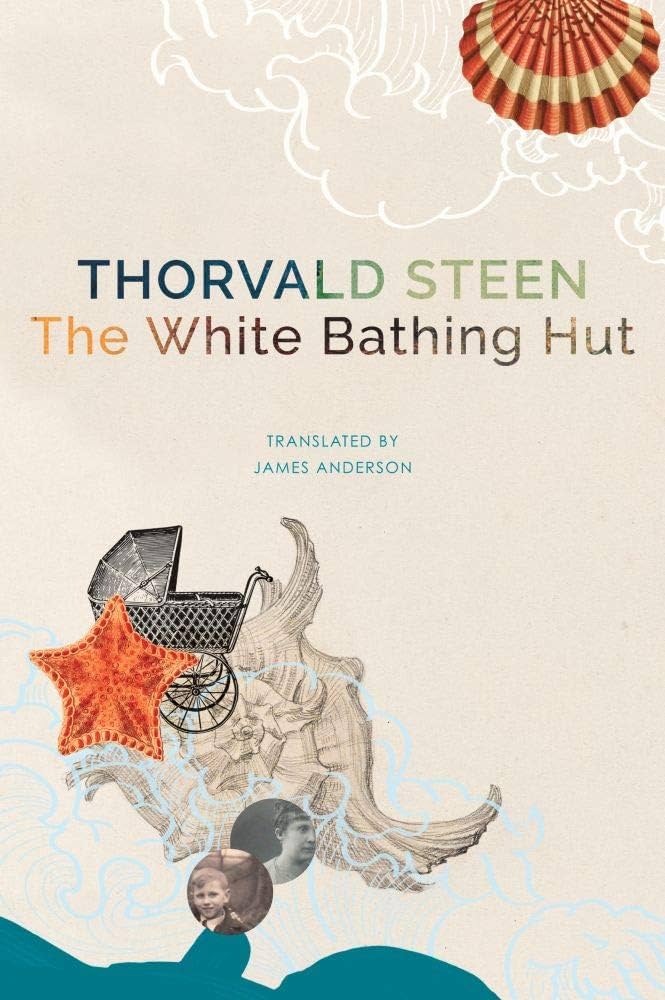by Nicole Yurcaba

Seagull Books is one of those publishers whose books definitely do not receive enough recognition. I discovered Seagull a couple of years ago, and I have consistently returned to them because their translations of Norwegian, Hungarian, and Slovak literature are on par, or even surpass, other notable presses focusing on such translations. Thus, it was no surprise to me when I recently fetched Thorvald Steen’s The White Bathing Hut — which I consider to be one Seagull’s best books — that I found myself unable to leave its pages. Translated by James Anderson, The White Bathing Hut is a gripping account of one man’s exploration of family secrets, his reconciliation with a body slowly defeating him and a society focused on eradicating those like him.
Described as a “genetic detective story,” The White Bathing Hut defies the conventions of typical detective fiction. It relies heavily on the psychological terror which develops when one finds themselves in a situation from which they cannot escape. The searing psychological tension develops when the novel’s narrator falls from his wheelchair when his wife and daughter are away and his cell phone is just beyond his reach. As he dissects his life, the narrator contemplates the silence his family embodied when he first received the diagnosis of a degenerative muscle condition that slowly inhibits his walking ability. As the narrator lies helpless on the floor, he clinically unpacks the secrets which shrouded his family for decades. His internal and external search for the truth provides both emotional and physical resilience as he grapples with other hardships — his mother is dying from cancer, and his daughter is afflicted with the same degenerative condition which has left him in a wheelchair.
Mirroring the narrator’s careful reflections, and facilitating the plot’s psychological and emotional impacts, is the novel’s structure. For the most part, the novel forgoes long, drawn-out chapters. Instead, it relies on minimal, direct, personal language and short, concise chapters which emphasize the narrator’s emotional turmoil. The novel is a direct example of how form facilitates function.
More powerful, however, are the narrator’s insights about how generational lies and secrets impact future generations. The narrator provides some pretty damning examples that are harrowing enough to anger just about anybody. For instance, in the book’s initial pages, the narrator notes his mother’s reaction when, after his diagnosis, his mother must complete a questionnaire from the school nurse. He observes, “Mother ticked ‘no’ and said that if I told the truth about my condition they would use it against me and us.” The mother also pointed out the long-term societal consequences for the narrator if she answered honestly: “Should a potential employer learn of the illness in the future, it would be an excuse not to employ me.” Thus, the narrator creates an even more powerful indictment–one against Norwegian society, which claims to abhor eugenics history yet seeks to control and greatly restrict the lives of those who live with disabilities.
The narrator’s commentary about Norwegian society and its strange relationship with eugenics is brief. However, despite its brevity, it is nonetheless shocking and thought-provoking. The narrator briefly invokes the eugenics philosophies espoused by Herman Joseph Muller. Muller, according to the narrator, claimed “that although its a human right to have one’s defects treated with all the means at society’s disposal, no one should have the right to pass on so many genetic, or partially genetic, defects, as to increase the load on society.” Muller’s ideas echo a frightening, ethical conundrum which, between 1923 and 1941, many of the Nordic countries embraced. Rather than focusing on racial purity, the Nordic eugenics movement focused on limiting marriage for and providing sterilization of mentally ill and disabled people. The narrator focuses on how Muller was described as “neither a Nazi nor a eugenicist” but as “an advocate of ‘germinal choice.’” The narrator considers Muller’s philosophies in correlation to Aris Antsaklis’s ideas about a “new eugenics,” which are “neither brutal nor cruel” but rather “human, because doctors now use technology” that is “good for mankind.” What the narrator settles on are the philosophies of one Antsaklis’s unnamed German colleague who espouses “‘The very individuals you all want to root out… individuals with defects, could, if they were allowed to live, contribute to the human race.’” These keen moments of self-reflection and self-awareness for the narrator are also moments of self-acceptance, but that self-acceptance comes with a disturbing realization: “Then, as now, the state and society want as little of my sort as possible. There’s no point in romanticizing my life.” Nonetheless, despite these rather disturbing instances of how the self might find itself in irreparable juxtaposition with society, The White Bathing Hut’s narrator offers readers something that might be a tad difficult to find in contemporary literature–hope.
While the narrator carries a continual sense of otherness because of his disability, he frequently informs readers about his perseverance not only in navigating his disease, but also the constant professional changes endured because of the disease’s merciless effects. He shares how he and his wife chose to have a child, despite the risks of the child inheriting the disease. He also shares that with time, there has been progress because studies have given doctors and scientists knowledge about the disease’s progression. Most profoundly, the narrator surmises that erasure and silence inhibit both individual and societal progress.
In essence, The White Bathing Hut is a jarring novel, because it’s told from the perspective of an individual most in society would rather not support or associate with, especially in societies which hold physical prowess in high esteem. At a time when ableism is at the forefront of many socio-political conversations, The White Bathing Hut is one of those literary contributions that cannot be overlooked.
Nicole Yurcaba (Ukrainian: Нікола Юрцаба–Nikola Yurtsaba) is a Ukrainian (Hutsul/Lemko) American poet and essayist. Her poems and essays have appeared in The Atlanta Review, The Lindenwood Review, Whiskey Island, Raven Chronicles, West Trade Review, Appalachian Heritage, North of Oxford, and many other online and print journals. Nicole teaches poetry workshops for Southern New Hampshire University and is a guest book reviewer for Sage Cigarettes, Tupelo Quarterly, Colorado Review, and The Southern Review of Books.



Add your first comment to this post